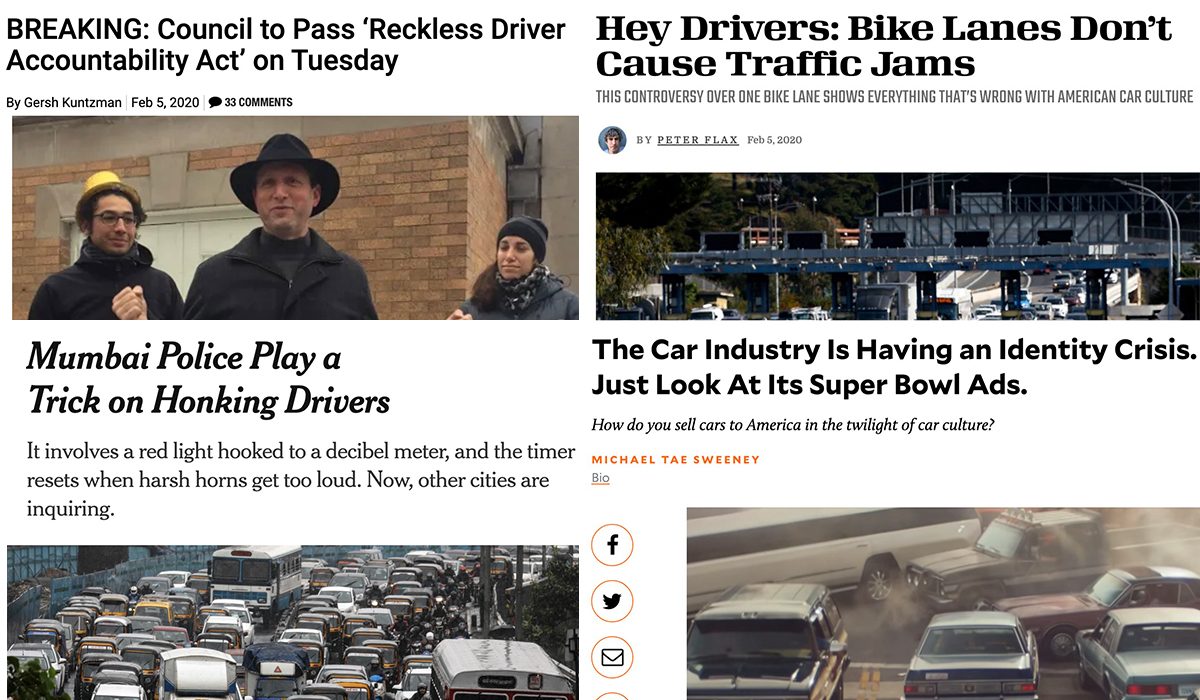
This week’s Monday Roundup is sponsored by Green Zebra Grocery, who invites you to the Grand Opening Party for their new SE Division store on February 15th.
Here are the most noteworthy items we came across in the past seven days…
Big SUVs: Great piece in Vice about how the auto industry preys on “inherently selfish” people to sell loads of impractical and excessive cars like the new electric Hummer.
Emoji jacket: Ford thinks bicycle riders would be a lot safer if they would wear a jacket with a digital screen that posts emojis.
Get used to it: Electric road bikes that blend right in with the pack are here and will forever change the dynamics of the group ride.
Car control: The League of American Bicyclists wants more people to tell the National Highway Transportation Safety Administration (NHTSA) that car testing standards should include vulnerable road users and be on level with the European Union.
Advertisement
Crime against the planet: A bike thief in Belgium was given a stiffer sentence because his crime was deemed to have hurt the environment when its victims were forced to use cars.
Frostbike: A major U.S. bike and parts distributor held its annual winter trade show and there was lots of cool new gadgets, bikes and gear.
Outsmart ’em: Police in Mumbai came up with a novel way to encourage people to honk less while waiting in traffic.
L.A.’s vision zero status: It’s not good, but I find some solace in learning that other cities are having some of the same problems we’re having.
Rad e-bike growth: I’m fascinated by how an unknown company — Rad Power Bikes — has become such a dominant player in the fast-growing e-bike market.
Stop pointing fingers: The always reliable writer and activist Peter Flax penned a much-needed response to a ridiculous op-ed in the San Francisco Chronicle that blamed new bike lanes for traffic on a key bridge.
Worst place to ride?: The BBC says Gaborone, Botswana is the worst city to be a bicycle rider because people feel that the streets are “more dangerous than lions”.
Advertisement
Finally: In what’s considered a major step forward for safe city advocates, New York City Council is poised to pass a bill that will proactively crack down on reckless drivers.
Racism in elite cycling: When an accomplished British bike racer reflects on his past career, there’s only one reason he can think of for not making it into the highest echelons of the sport: his skin color.
The streetcar solution: The Oregonian has a good update on Portland Streetcar, a mode of transit we don’t hear much about these days.
Bag fee inspiration: Joe Cortright at City Observatory says if Oregon can muster the political will to institute a fee on plastic bags we can do the same for carbon.
Tweet of the week : Noted Portland-based transportation researcher Jennifer Dill posted a dreamy video of San Fran’s carfree Market Street
Amazing to see car free Market St. in San Francisco. Hundreds of people moving on wheels of many kinds. pic.twitter.com/ccA8TukjUa
— Dr. Jennifer Dill (@JenniferDillPSU) February 8, 2020
Thanks to everyone who sent links in. Y’all are the best!
— Jonathan Maus: (503) 706-8804, @jonathan_maus on Twitter and jonathan@bikeportland.org
— Get our headlines delivered to your inbox.
— Support this independent community media outlet with a one-time contribution or monthly subscription.

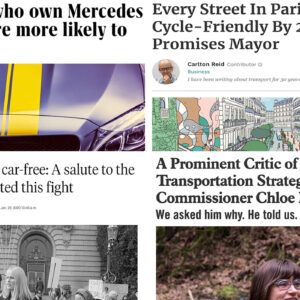
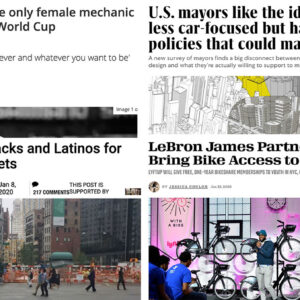
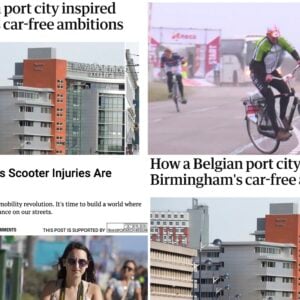
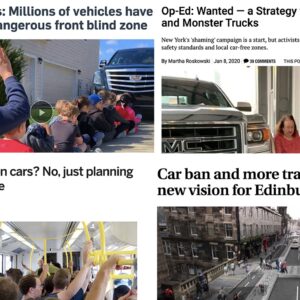
I love the “crimes against the planet” used to punish those who take cyclists off the street. We should adopt it for all manner of crimes, from stealing bikes, to injuring cyclists or pedestrians so they can no longer continue their non-motorized transport. But instead of filling our overcrowded prisons with these eco-criminals lets set up work crews, so these future felons can spend their 3 year sentences building bike lanes and pedestrians infrastructure.
Like having a kid.
Yawn
Could we have a practical and intelligent event like those highly competent ladies in Botswana with pails of water on their heads?
Regarding the Carbon fee, I’m wondering if it will be applied differently to people of differently economic strata.
E.g., are we going to require wealthier people to pay more or not require less wealthy people to pay anything.
This is a thoughtful question. My bias informs me that the tax would be flat. How can socio-economic status be establish and demonstrated at the gas pump, while maintaining privacy? Disregarding privacy, how would this metric be established? Stratification would require oversight and all sorts of staff. Great for the unemployment rate, but costly.
Very likely, the flat tax would not be fair. I don’t see an alternative though.
The bill SB1530 establishes a cap and invest program. This is a quantity based approach whereby emissions caps are set and the price varies by whatever amount is necessary to meet the caps set by the bill. There isn’t a delineation based on income. However, there is a required carve out that 10% of funds raised be spent to assist low income communities. Additionally, there is a phase in approach where the PDX metro area’s transport emissions are covered initially and then other metro areas by 2025. The approach is to exempt rural drivers who lack public transit options. At the end of the day, its estimated the bill would cover 87.5% of transportation GHGs emitted in Oregon.
>>> I’m wondering if it will be applied differently to people of differently economic strata. <<<
I think the best solution to this is to take some of the proceeds and use them to cut everyone a check. That money can be used to offset carbon fees, or, if you reduce your carbon consumption, can become a source of income.
I think it's important (politically) to not frame this as income redistribution, but if you believe that those with more money emit more, then that's exactly how this would play out.
“but if you believe that those with more money emit more…”
Why do you posit this as a hypothetical?
Because my assessment of the situation is unimportant.
Do poor folks drive cleaner cars or use their disposable income chasing cleaner technologies?
Do poor people have disposable income?
Some do, yes.
While ramping up a rebuttal to this comment, I discovered that we have been using the wrong term. According to Investopedia.com, we should be speaking about “discretionary income”.
Disposable income is income – taxes, whereas discretionary income is disposable – necessities.
https://www.investopedia.com/terms/d/disposableincome.asp
I want to rebuttal you, but I think it would be unfounded. I mean, do children of poor parents have toys? Yes, and it’s not due to charity. Parents will “beg, borrow and steal” to make a child happy. But certainly, I think we can agree that chasing fuel efficient technologies is less of a priority for folks with less money to burn. A cheap car that burns oil and gets poor mileage is more accessible than a Tesla. You can whittle down the divide between those two points, but it’s still a luxury.
When I said, “do poor people have disposable income”, I really just wanted people to think about the question and maybe put them self in the role of a ‘poor person’.
Your reply was to Hello Kitty though.
My point was not to distinguish between “disposable” and “discretionary” income, but rather to comment that a great many people lower on the income scale are not the stereotype of “poor single mother on the edge of starvation working three jobs just to hold on.”
True, many may not be buying luxury cars like a Tesla (just as many people who could afford a Tesla drive a Honda instead), but they may well consume in ways that has a larger carbon footprint than people earning more but living a less consumptive/less drivey/less meaty lifestyle.
I generally find comments like “the poor do this” and “the rich to that” to be cartoonish and unhelpful.
What I think is cartoonish and unhelpful is pretending like there is no statistical relationship between income and transportation energy expenditure.
https://www.eia.gov/todayinenergy/detail.php?id=20772
(Second set of charts are relevant here)
Outliers are interesting and important, but so is the basic realization between these variables.
I would also speculate that there is a larger spread in the income levels of low energy users than there is in the energy use of poor people. Lots more could be said about this.
I posed my statement as a hypothetical to avoid exactly this conversation.
“Do poor folks drive cleaner cars or use their disposable income chasing cleaner technologies?”
The question is absurd, and peevish, and Jason already pointed out the chief reason.
Poorer folks drive less;
poorer folks fly less;
poorer folks buy less stuff;
poorer folks own fewer square feet of heated/cooled dwelling space per person;
poorer folks vacation closer to home;
poorer folks live less long;
Shall I go on?
Re; Big SUVs. Knowledge of their wastefulness can incite change. I got fed the ad linked below for the new Ford Expedition that shows a 7-8 passenger massive SUV only occupied by the driver while the VO smugly boasts about its sheer “bigness”. It’s like self-mansplaining to oneself that “you really deserve it, don’t let anyone tell you that you should have any regrets”.
While I would have never been interested is such a ridiculous vehicle, in earlier times it would probably go by unnoticed as just something other people normally buy, but now the excess, the absolute waste and pandering to selfish disregard for anything other living beings on the planet is just repugnant and I’ve even discussed it with several people I know and now all of you. Knowledge is strength, not ignorance.
https://www.youtube.com/watch?v=2gVfZHmPM0Y
It is great to see NYC actually looking at enforcing traffic laws and impounding cars with multiple automated camera moving violations. It is time for Portland to add a lot more cameras and do the same. To satisfy any concerns about racism just make sure the cameras show are placed in all parts of the city equally. If there are no consequences people are going to continue to break the law.
And if there are still concerns with the fairness of cameras, put them all in my part of the city. I’ll take the extra protection if others don’t want it.
Just don’t use them to feed databases that track our movement. If you are not violating the law, any data collected should be deleted immediately. This should be state law.
All that tracking data from traffic cameras is redundant. Google and Apple know more about us than any government agency via the apps on our phones and our internet searches.
Google and Apple can’t arrest me or put me in a cell. At least not yet.
You may already be in a jail you can’t see.
Given the systemic lack of candidates for policing, technology will be the easiest way to go for any kind of enforcement. Could you imagine how much money could be made and reinvested into alternative modes?
“Let’s be frank. The congestion on the Richmond-San Rafael Bridge (and roadways in every U.S. city) can really suck. But it doesn’t suck because of cyclists or bike lanes. The traffic sucks because of sprawl and cheap gas and Americans’ love of cars.”
Boom. Mic drop.
It sucks, quite simply, because those who suffer through it have (for the most part) chosen to do so. They weren’t forced by sprawl or cheap gas. As the situation gets worse, those least tolerant will make different choices and the situation will stabilize where the cost in dollars and suckiness is equal to people’s willingness to pay.
Or we’ll get our robot cars and the situation may become a lot more tolerable.
Not even close to the truth.
Read anything by Catherine Lutz.
https://bikeportland.org/2015/11/24/very-few-poor-people-drive-to-work-downtown-169016#comment-6594192
Why is what she writes “the Truth”? Just because you believe it?
As usual you are refusing to engage with her argument, but instead blow smoke in our faces. Have you read her argument? Do you disagree with it? If so, why don’t you say how you disagree instead of trolling these conversations.
I find her argument persuasive, articulate, plausible, given my experience of the world. Her explanations ring true, and if they don’t ring true for you then we all might learn more if you came out and said so, invested something of yourself in these discussions, took (the slightest) risk by actually committing to a position, any position, besides troll.
What I don’t understand is why you linked to another BP.org post instead of source material to express your suggestion that Catherine Lutz is a noteworthy intellect. I am -not swayed by your choice.
The passages I quoted in that earlier conversation were a bit long and I figured (perhaps erroneously) that by using the link function (which I very rarely do) it would also work. I’m sorry you didn’t like that choice.
The source material is right there in the link. Are you saying the extra step you were forced to take makes the case unpersuasive, or Ms. Lutz’ argument itself is unpersuasive?
Example:
According to Writing Help Central, you want to leave as little confusion as possible in so far as what you want the reader to read.
“Direct readers as closely as possible to the specific information being cited. So, whenever possible, reference the specific document to which you refer, rather than mome or menu pages. ”
http://www.writinghelp-central.com/apa-citation-internet.html
OK.
But The context here is my attempt to engage with MotRG, and I feel like we are so far from what your source asks of us that we need to keep things in perspective. In my posts I almost always give sources, explain my thinking, commit to a position. He rarely does any of that.
Professor Dill, thanks for sharing the photos of car free Market Street … I remember well riding it and fighting car drivers and police for safe street space there in monthly critical mass rides in the 90s. Perhaps someday we will look back collectively at Critical Mass as the ”Stonewall Riot” for vulnerable roadway users! ♀️
Bikeportland edited my emojis
Yeah, this forum can be janky.
From my perspective, we just agreed.
🙂
Guess that didn’t work.
I have come to accept that in order to save ourselves we will need to eventually (1) get ourselves to zero or negative carbon output, and in order to do that we will (2) need to use zero fossil fuels.
I also believe that we will do this a lot later than we should. Few people – even most of us pushing for climate change to become a top political issue – seem remotely ready to accept or even comprehend the massive lifestyle changes that will be needed.
I don’t think automobility is going to disappear as 9watts repeatedly prophesies, but it will change, a lot. We’re all going to have to live closer together, in smaller, less heated/air-conditioned homes than we to today. That’s going to mean less room for cars, which will have to be fewer and smaller on the whole, and a lot more bike, pedestrian and mass transit infrastructure. Even that less-than-horrible outcome assumes we convert our motor fleet to non-fossil-generated electricity, coincidentally developing Thorium-based nuclear power to partially replace fossil fuel sources that we have to put a cork in, as candidate Yang had been proposing.
Whether a carbon tax is the ultimate mechanism or not, energy is going to become very expensive, which will disproportionately impact the poor. There are a lot of ways we can mitigate that harm, tax credits among other mechanisms … but with non-rich people necessarily having to downgrade/downsize their lifestyles, there probably won’t be as much sympathy as there should be for the poor.
Until we are really ready to act dramatically against climate change (which could be 5 years from now, or 50) I’d like to see us working on reducing the increasingly dramatic income inequalities in our society. Right now we’re on track for median African-American household wealth to drop to zero in a couple of decades, and I think we all know about those 3 guys that now have more wealth than the bottom 165 million Americans. If we could even get income and wealth inequality back to where they were 30-40 years ago, that would drastically reduce the harm to poorer people when we finally take decisive action against carbon emissions. It might not seem like a climate issue, but before long everything is going to become a climate issue.
“ I don’t think automobility is going to disappear as 9watts repeatedly prophesies, but it will change, a lot.”
I’m open to that possibility, but as you then go on to detail for this to happen lots of pieces need to fall into place, many of them improbable. Much easier to envision automobility-as-we-know-it going away.
You say a lot needs to fall into place in order for “automobility” to not go away. This is totally backwards. The default condition is that it will remain. Nothing needs to happen for it to stay, but a lot needs to happen for it to go away or change radically.
That is funny, Hello Kitty!
Rear-view mirror as guide-to-the-future, eh?
I will point out that I was specifically responding to GlowBoy’s enumeration of what he felt would need to happen.
Automobility going away also means rich people are forbidden to have cars, and everyone living in outlying suburbs and rural areas finds their cost completely prohibitive. I don’t think that will happen, not even if we turn the clock back 50 years on income inequality and achieve all the stuff I described above. There will still be wealthy, and there will still be people living in the countryside.
Yes, we may get to the point where the vast majority of people living in densely populated cities will not own cars. But that is not even close to the same thing as automobiles completely going away.
I think automobility going away could take many different forms. Autos as the default mode that receives nearly all the public funds spent on transportation is a shorthand for what I think of in relation to the term automobility. If this hegemony ends, and it most certainly will, then I take that as an end to automobility. By that term I don’t mean that all autos vanish, all roads are narrowed, the horses come back out. The decline, the end, is a process. Expecting a car zapping authority or a sudden cataclysm is not the only or the most likely pathway by which this will occur.
Well, then although using different language we agree. We both believe that the dominance of automobiles will have to end for us to have a functioning post-fossil society.